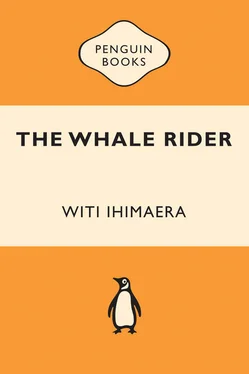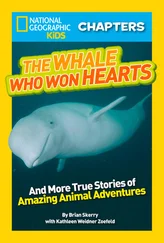Witi Ihimaera - The Whale Rider
Здесь есть возможность читать онлайн «Witi Ihimaera - The Whale Rider» весь текст электронной книги совершенно бесплатно (целиком полную версию без сокращений). В некоторых случаях можно слушать аудио, скачать через торрент в формате fb2 и присутствует краткое содержание. Год выпуска: 2008, ISBN: 2008, Издательство: NZ ePenguin, Жанр: Современная проза, на английском языке. Описание произведения, (предисловие) а так же отзывы посетителей доступны на портале библиотеки ЛибКат.
- Название:The Whale Rider
- Автор:
- Издательство:NZ ePenguin
- Жанр:
- Год:2008
- ISBN:9780143011392
- Рейтинг книги:4 / 5. Голосов: 1
-
Избранное:Добавить в избранное
- Отзывы:
-
Ваша оценка:
The Whale Rider: краткое содержание, описание и аннотация
Предлагаем к чтению аннотацию, описание, краткое содержание или предисловие (зависит от того, что написал сам автор книги «The Whale Rider»). Если вы не нашли необходимую информацию о книге — напишите в комментариях, мы постараемся отыскать её.
From School Library Journal
Grade 5–8–Witi Ihimaera blends New Zealand’s Maori legends with a modern girl’s struggle to have her special gifts recognized in this novel (Harcourt, 2003). Though Kahu is the first child born in her generation and she is well loved by her extended family, she seeks the approval of Koro, the stern man who is not only her great grandfather but also her clan’s chief. Family lore is filled with stories of Koro’s ancestor who rode a giant whale to bring his people to New Zealand. Their village continues to have a special relationship with the sea and its creatures. When a pod of whales is stranded on a nearby beach, everyone in the community works to save them. Many animals are lost and only one desperately weak whale is turned toward the sea when Kahu climbs onto his back. Both the whale and the girl feel their ancient connection, and when Kahu rides off, her great grandfather finally sees that she is the next leader for her clan. Though the eight-year-old girl is feared lost, her whale companion has left her where she can be found and reunited with her family. Narrator Jay Laga’aia handles the book’s poetic rhythm and its Maori words and phrases with an easy tempo and honest emotion. Occasionally the sound quality seems too quiet, but it reflects the novel’s introspective sections. Though the Maori language may be a challenge for some listeners, the universal theme of a child looking for acceptance makes this a good additional purchase for middle school and public libraries. It’s worth noting that
was made into an award-winning film a few years ago.
Barbara Wysocki, Cora J. Belden Library, Rocky Hill, CT
Copyright © Reed Business Information, a division of Reed Elsevier Inc. All rights reserved.
From Booklist
Gr. 7-12. Kahu is a girl, born into a contemporary Maori family that traces its lineage to the magnificent Whale Rider, a fabled ancestor who traveled the seas astride an ancient whale. From an early age, Kahu possesses a chief’s mystical aptitude, but her grandfather believes that chiefs must be male, and Kahu’s talents are overlooked. Rawiri, Kahu’s young adult uncle, narrates this novel, which is part creation myth, part girl-power adventure, and part religious meditation. Chapters alternate between Rawiri’s telling of Kahu’s story and scenes of the ancient whale. The two stories come together in powerful events that, as Rawiri says, have "all the cataclysmic power and grandeur of a Second Coming." With such esoteric material and many wandering plot threads, the story may prove difficult for some readers. But Ihimaera, best known for his adult books, combines breathtaking, poetic imagery, hilarious family dialogue, and scenes that beautifully juxtapose contemporary and ancient culture. A haunting story that is sure to receive additional interest from this summer’s film adaptation.
Gillian Engberg
Copyright © American Library Association. All rights reserved












